Miranda Lambert Goes Her Own Way
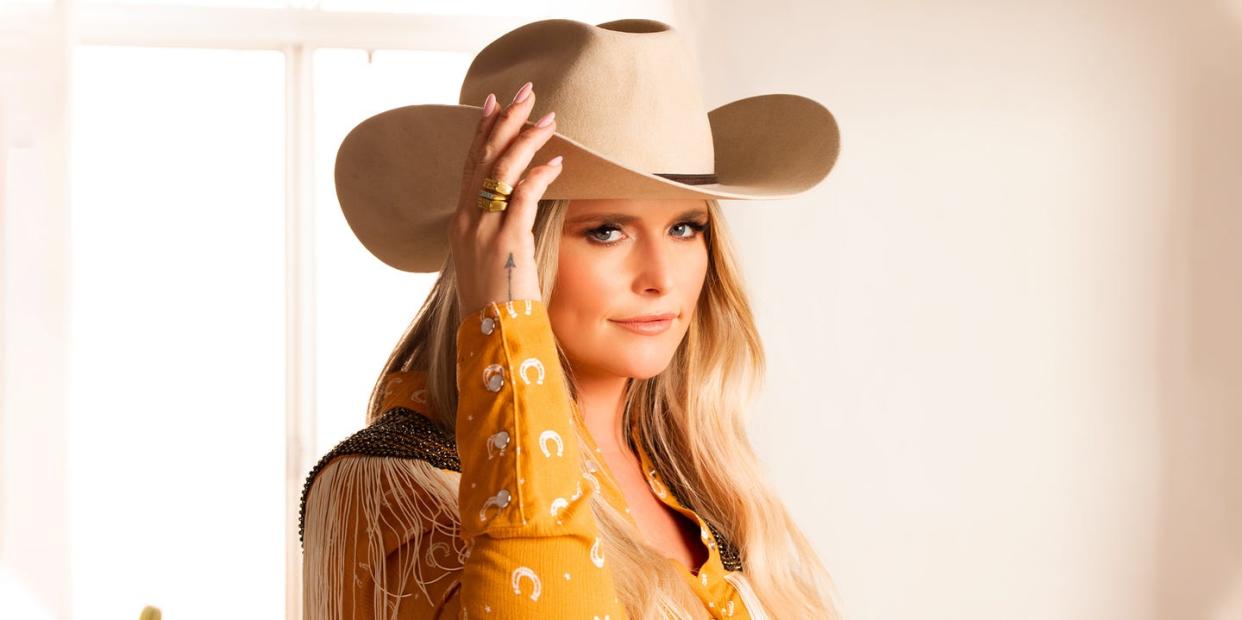
- Oops!Something went wrong.Please try again later.
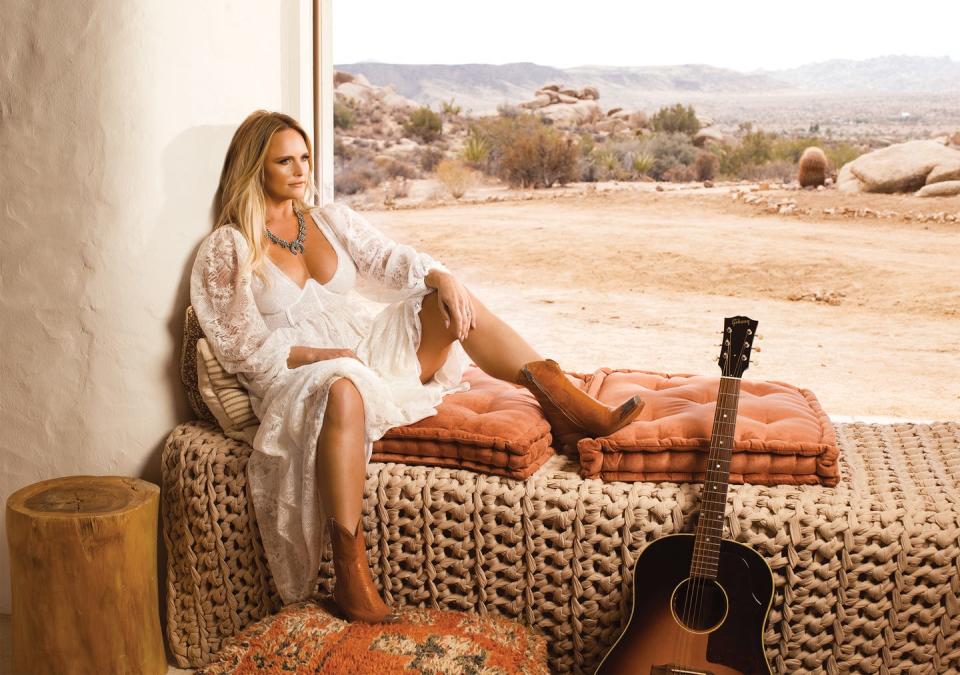
It was 2010, and Miranda Lambert was nervous. It had been five years since her major label debut album, and though she had seen steady success, she had not yet had the breakthrough hit single that would establish her as a serious force in country music.
Country radio (which, to this day, holds more power for its audience than in other genres) didn’t seem quite sure what to do with this fiery young woman who, unlike many of her peers, wrote most of her own tracks. Early on, Lambert was defined by wild-eyed revenge songs like "Crazy Ex-Girlfriend" and "Gunpowder and Lead"—"I was pigeonholed,” she says, "like, 'Oh, she'll just burn your house down or shoot you.'" Then the sassy, simmering "White Liar" started making a run, pushing its way into the Top Ten.
"The town was watching," she says over a screen from her house in Nashville. "Like, 'Is she ever gonna have a hit or she just gonna be one of those other kinds of artists?' I was frustrated—at some point, I wanted to move up. I wanted to get the middle slot on tours instead of the opening slot, and ultimately headline, and in country music, radio is that vehicle."
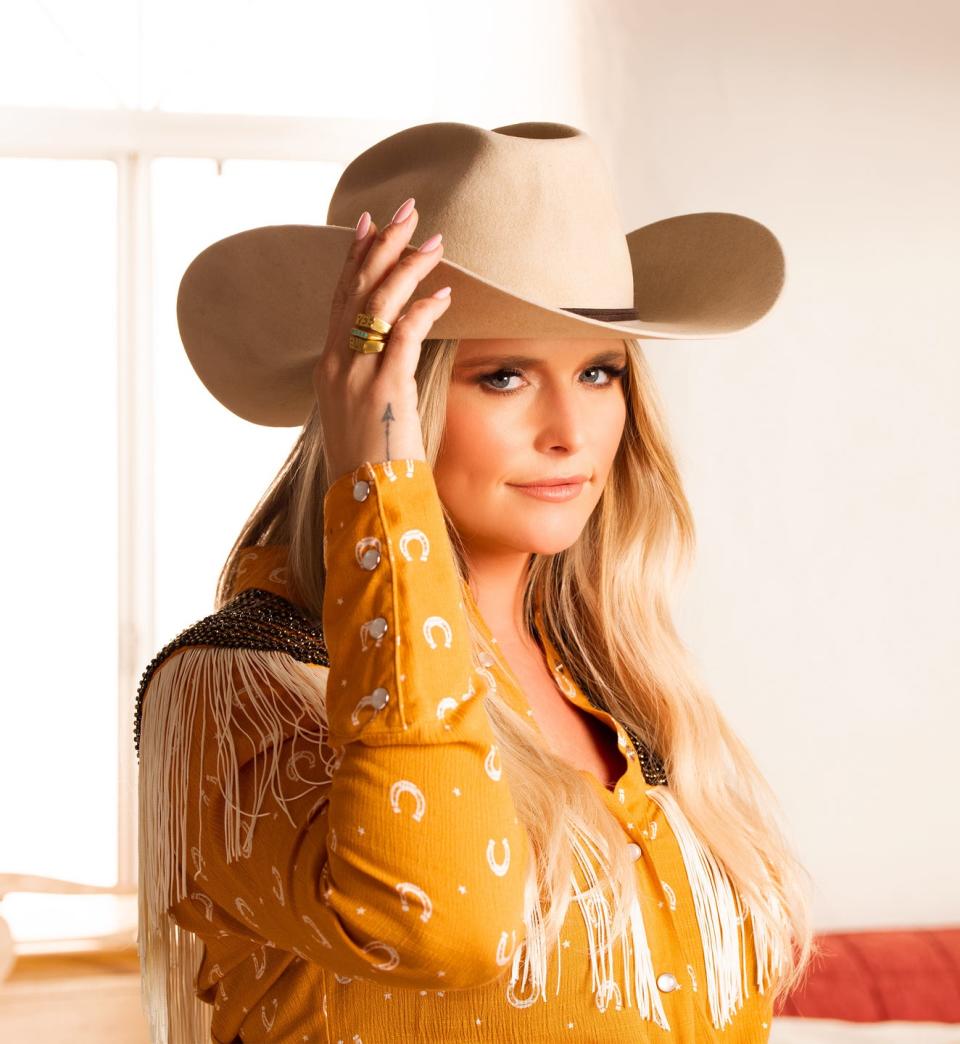
Lambert was on tour with Brad Paisley as the song was flirting with the top of the charts. "If I don't get this Number One now, I don't know that I’ll get one," she remembers thinking. She gathered her friends, family, band, and crew in her arena dressing room. She even roped in some of Paisley’s team as well as opener Justin Moore's band and put the whole squad to work calling radio stations to request the track. She waited up till 3 a.m., when the new charts were released, and someone from her label called and said, "We did it."
"I took the biggest deep breath," she says, "and I knew then I was OK."
"White Liar" just barely squeaked to the top of the MediaBase radio charts, but it started a sensational run for Lambert, with ten Top 5 singles over the next six years as she established herself as one of the brightest stars in Nashville. The range of her music continued to expand, and her critical acclaim grew even more dramatically: She has won 37 awards from the Academy of Country Music, more than any other artist in history, including a recent victory—her first, and the first solo win by a woman since Taylor Swift ten years ago—in the Entertainer of the Year category, the biggest prize of them all.
Lambert, just back from a vacation in Ireland with her husband ("He had never been to Ireland and his name's Brendan McLoughlin," she says, "so we needed to go to the homeland"), maintains that the award was a surprise, even after her dozens of previous victories. "To be honest, I had given up a little bit on winning Entertainer," she says, "because females win so few and far between—and not just because of the female thing, but because all the winners pretty much deserve it. I had a few years when I really felt like I worked my ass off, like I might have deserved it, but it's not something you just win out of the blue. It's your peers going, you did it big this year."
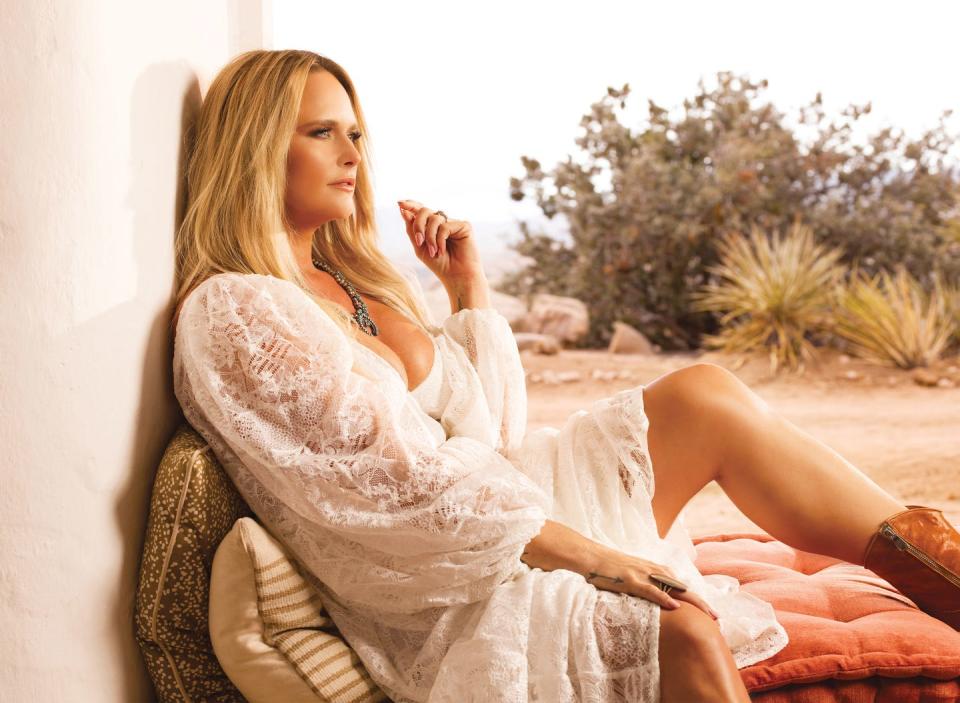
It was an interesting time to win this particular trophy, since it’s generally seen as recognizing the biggest touring act, and concerts were pretty scattershot in 2021. But Lambert managed to showcase multiple sides of her work over those months, releasing The Marfa Tapes (a Grammy-nominated collection of live, one-take acoustic songs recorded around a campfire on one microphone); a Christmas album, Hell of a Holiday, with her girl-group side project, Pistol Annies; and the single "Drunk (And I Don’t Wanna Go Home)," a duet with country rocker Elle King that’s the glossiest, poppiest recording of Lambert’s career—which just hit Number One on country radio. (Meantime, she also maintained her MuttNation Foundation, promoting the adoption of shelter pets, and her buzzy Idyllwind apparel brand, which launched in 2018, and opened Casa Rosa on Nashville’s Lower Broadway, making Lambert the first female artist in town with a branded bar.)
"Miranda doesn't ask permission,” says King. “She just makes the music that she wants to make. To have someone like that in this industry as a marker of freedom, of self-expression, of self-confidence is truly amazing."
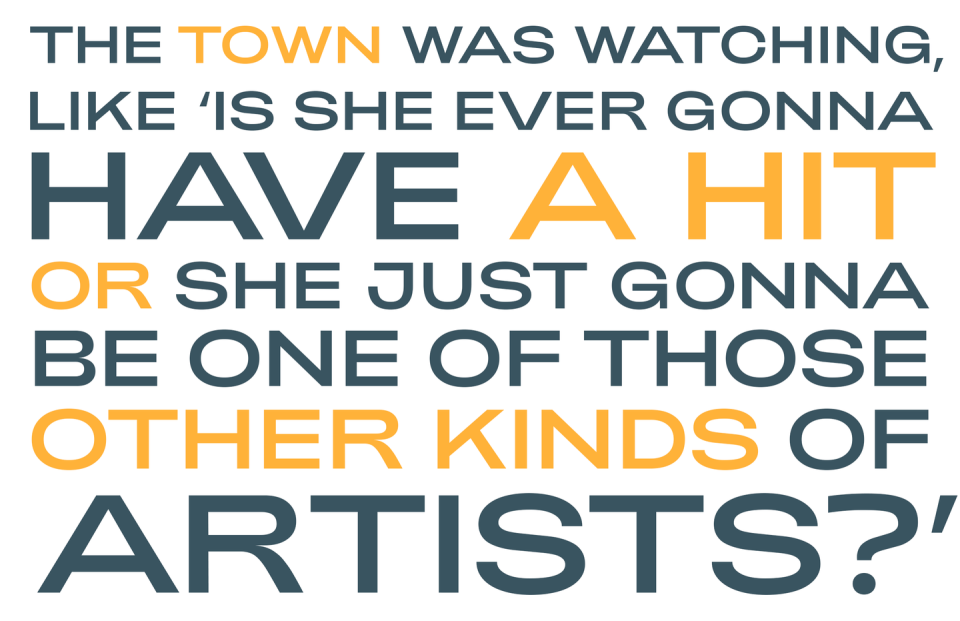
Now, at age 38, Lambert returns with her eighth studio album, Palomino, a stunning summary of all her strengths and styles, eclectic and cohesive and yet another step forward in a career that has stood, from day one, for creative evolution and growth. Most of the album was written on her farm outside of Nashville, where she and her new husband have been based for most of the pandemic (“It could be tricky,” she says, “because it’s country Internet, so with any Zoom stuff I had to do, the wind blew, and it would knock me off”).
She invited songwriters Luke Dick and Natalie Hemby out to join her with no schedule and zero expectations. "It's really interesting to have time just to write because you want to," she says. They sat by the lake and came up with "Tourist" and "Scenes," and realized that—maybe because they were unable to travel—a theme was emerging. "Those two songs set up a journey," says Lambert. "This record takes you to 36 different places in the US, and you meet all these characters, and we go from the East Coast to the West Coast. We actually pulled maps out and went, 'Where have we not been?' We hadn't been to Nashville, so we wrote 'Music City Queen,' and we hadn't been to the Northeast—which means a lot to me now, being married to New Yorker—and wrote 'Pursuit of Happiness.' It's not a concept record, that seems like too much, but it was very intentional."
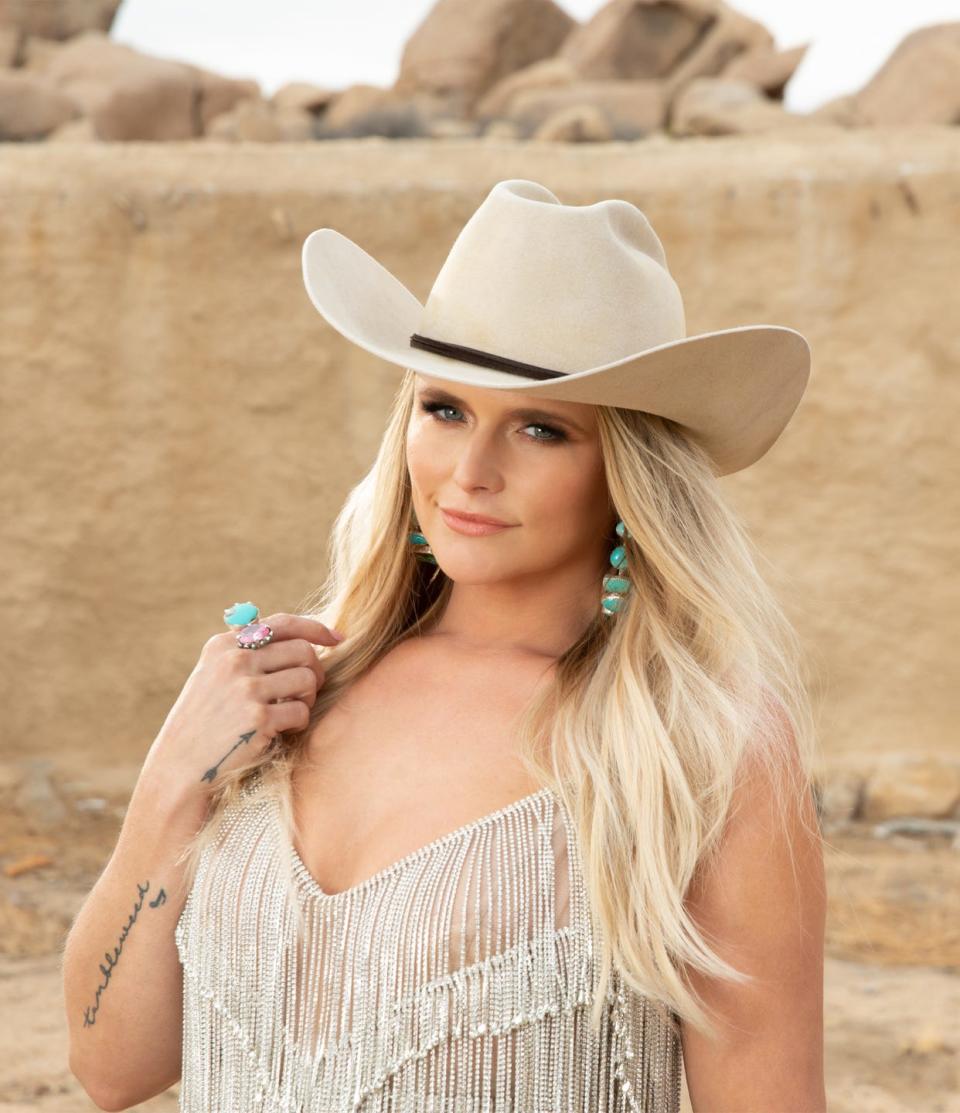
At the start of lockdown, Lambert went six months without writing a song. "I've never taken a break that long ever," she says. "And it really made me realize a lot of things about how I've been on the grind for so long. I felt better, my body felt better. My husband and I were pretty much newlyweds, and we really got to spend such great time together. We bought an Airstream, and we camped up to see my stepson in New York, and went on the road, just us two, and it was really cool. I think that really built some strength in our new marriage.
"Brendan also started making homemade bread,” she continues. "And when I finally put jeans on again, I realized that the bread had to stop."
Miranda Lambert was born and raised in East Texas, the daughter of two private detectives who worked on the impeachment case against Bill Clinton but got wiped out by the oil crash. In high school, she hit the popular, hardscrabble Texas music circuit, self-releasing an album in 2001. In 2003, she was a contestant on the USA Network’s Nashville Star series. She finished third, catching the attention of Sony Music executive Tracy Gershon.
Kerosene, Lambert’s debut album on Epic Nashville, came out in 2005, entering the Country Albums chart at Number One and eventually being certified platinum. Most notable, though, was the fact that out of the album’s twelve songs, the rookie had written or co-written eleven—at a time when few Nashville artists wrote their own material, or at least had to earn the chance to do so after racking up some hits.
"Nineteen and fearless" is how Lambert describes her attitude when she first hit town. "I was like, 'I can go back to Texas if you don't want my songs.' Texas has its own cool music scene and charts and everything, so I had something I could fall back on if they were trying to change me or make me sing new songs I hate." The Sony team, to its credit, went for it, and the results were immediate. "I got to set that stake in the ground then, so that I could continue it through all these years," she says. "I think that's why I keep trying to step up my game as a writer, because I was given that opportunity to be trusted by the fans and by this town."
Jon Randall, who co-produced Palomino and was featured on The Marfa Tapes alongside Lambert and Texas music icon Jack Ingram, met Lambert during the Nashville Star days. "She worked harder than anyone I've ever seen," he says. "Even before she had a deal, she would play anywhere for anybody that would listen. She wasn't worried about the glam, and she’s still like that. Even where she is right now, she really doesn't give a shit—'I'm going to do what I'm going to do, and I'm going all the way; I'm not going to go half-assed.'"
The hot streak that Lambert started around 2010 coincided with a major transformation in her offstage life; that year, she got engaged to superstar Blake Shelton, whom she had been dating since 2006. Married in 2011, they were country music’s latest golden couple, staples of the tabloids and the celebrity press—especially as the marriage turned rocky. As if the pressures of being two touring musicians wasn’t enough, there were rumors that Shelton was excessively distracted by his work on The Voice, disagreements between the two over having children, and accusations of infidelity. They filed for divorce in July of 2015.
A few months before that announcement, I saw Lambert backstage before her performance headlining Madison Square Garden. She clearly didn’t want to be there, and on stage, she seemed checked out and listless. When I mention that show to her, she instantly knows the night I’m talking about. "I'm sorry that you felt that for me, because it was real," she says. "I had a fan tell me at a meet-and-greet a couple years ago, 'I'm so glad to see you happy, because I saw you twice when you were sad—and I was crying with you.' So I'm sorry that I showed you that, but one thing I'm not is fake.
"My life was in a bad place. I was not at my best emotionally, I was exhausted, I was going through horrible personal things and a very public divorce. And it's hard because the show must go on, because we're there and the fans are there. You don't get to call in sad, you just go do it. I think about those shows during that time—and there was a lot of them—and it was just like, Man, this is normally when a person would go grieve, in quiet, and heal, but I was on tour. There wasn't any time."
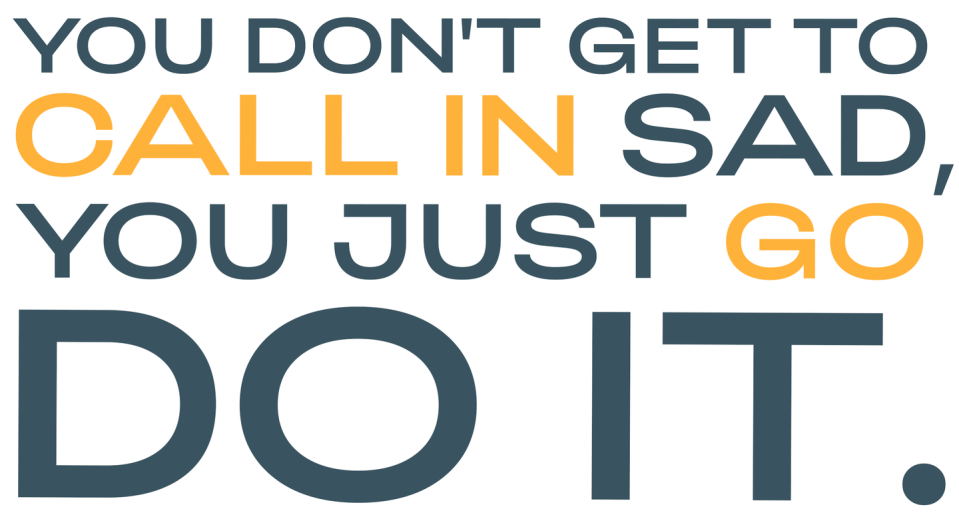
Meantime, country music had also taken a turn. It was boom time for bro-country, as the new style focusing on beer, trucks, and girls in cut-offs (with a little dash of hip-hop beats for flavor) was dubbed. Lambert retreated for a while, processing the split with Shelton and a new relationship with singer Anderson East, and in 2016, released a more acoustic, singer-songwriter-based double album titled The Weight of These Wings—disc 1 subtitled "The Nerve" and disc 2 "The Heart."
"It took me a year to make, it was different types of songs, a double album—which is never popular—but I just needed to do it, and I felt like I earned it," she says. "I didn't expect it to be played in between all the truck songs. I knew what I was getting myself into and was OK with it." The Weight of These Wings won her fifth straight Album of the Year award at the ACMs, and Rolling Stone placed it on their most recent list of the "500 Greatest Albums of All Time."
Then Lambert met McLoughlin, a police officer from Staten Island, in November of 2018 when she appeared with Pistol Annies on Good Morning America and he was working security. Barely two months later, they were married; she dropped the news on Valentine’s Day. The couple lived in Soho for six months, and the energy of New York City (she wrote the song "Fire Escape," she notes, while sitting on one, having never grown up around any in Texas), along with the excitement of the new marriage, informed her next album, Wildcard. "I was back in a happy place," she says. The set won a Grammy for Best Country Album of the Year.
Yet her old friend and collaborator Randall insists that all these changes and challenges, ups and downs, have not changed Miranda Lambert. "As Bill Monroe used to say, 'she’s never gotten above her raisin,'" he says. "One time, because of plane delays and flight cancellations, we ended up in Marfa without any of her bags. And before Jack and I could even get out of bed and get coffee going, she'd gone into town and bought some sweatpants and T-shirts and make-up at Dollar General. And she's like, 'I’m good, I got this.' A lot of artists in that world would be like, 'Oh, I gotta have my person go to El Paso,' but Miranda was like, 'I'll just go to Dollar General—they'll have everything I need.'"
The latest season of Queer Eye is set in Texas, so logically enough, Netflix approached Lambert to write a theme song. After she "binge watched the show and cried my eyes out," she called her younger brother, Luke, who is gay and lives with his husband in Austin. "I was like, 'Give me some like cool phrases—what are the cool kids doing right now?'" she says. "And he's like, 'Well, there's a hashtag going around right now that’s "y’all means all.'" And I was like, 'Oh, my God, that’s it! I'm taking you on a beach trip, you totally gave me the song title!'"
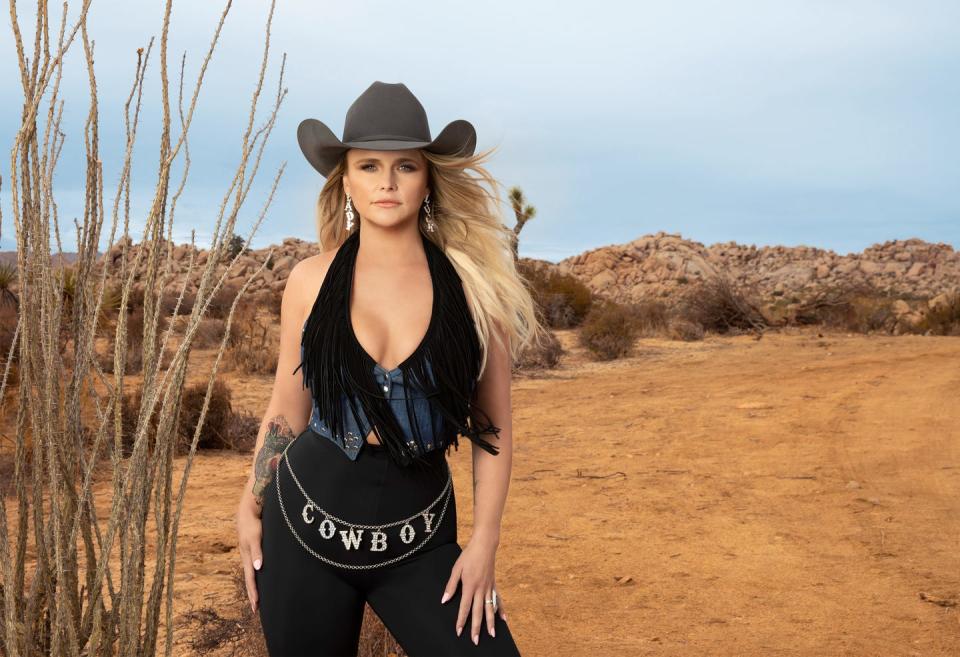
Lambert contends that "I don't usually do politics at all," but that she felt it was necessary to speak up for LGBTQ+ inclusion. "My brother and his husband and their group of friends have really taught me a lot," she says. "We're from a small town in East Texas, so they're teaching me how to see the world in a different way and be appropriate with my language. And it made me realize that I need to be more vocal if I can—I’m definitely so much happier now that I'm talking about it more, trying to learn and trying to help in any way that I can and be part of a good change."
She recognizes the often-overlooked impact that country music has had on social issues, especially though songs—including such progressive moments as Loretta Lynn with "The Pill" or Johnny Cash doing "Man in Black."
"There's so much noise out there, and a lot of it's bullshit," she says, explaining her reluctance regarding overt activism. "My job as a musician is, y'all come to a show, raise a beer, forget about all that crap for an hour and a half. So I love that they could do that in a song, and not just a rant on social media. You didn't need to do anything but write that chorus and now I know exactly what you're talking about."

Nashville is facing a very public reconsideration around representation in the genre, from increasing visibility for Black artists to the continuing struggle for women to compete at radio to T.J. Osborne of the band Brothers Osborne becoming the first major label country star to come out.
Lambert believes that the country music community is doing "a pretty dang good job" of trying to improve around these issues. "'Y’all Means All' was me going, 'Oh, I see how I could do better.' I'm only one person, but if every single person did one little thing, that’s a step forward. Maybe when you look at the big picture, it feels like it's too slow, or it's not enough. But it doesn't change overnight—if people are trying to educate themselves and ask forgiveness or apologize or whatever, that's moving forward. And that's all we can do as humans."
For Randall, in her quest for moving forward, Lambert recalls a Hall of Fame artist he played with for many years. "Emmylou Harris completely reinvented herself five times in her career, always chasing something from an artist’s standpoint," he says. "Dolly’s the same way, and Miranda reminds me a lot of Dolly—coming up by humble means, working her tail off, dealing with the adversity that women have to deal with in this business, being more talented than most of the men…well, all of the men, really. She's cut out of the same cloth as her heroes."
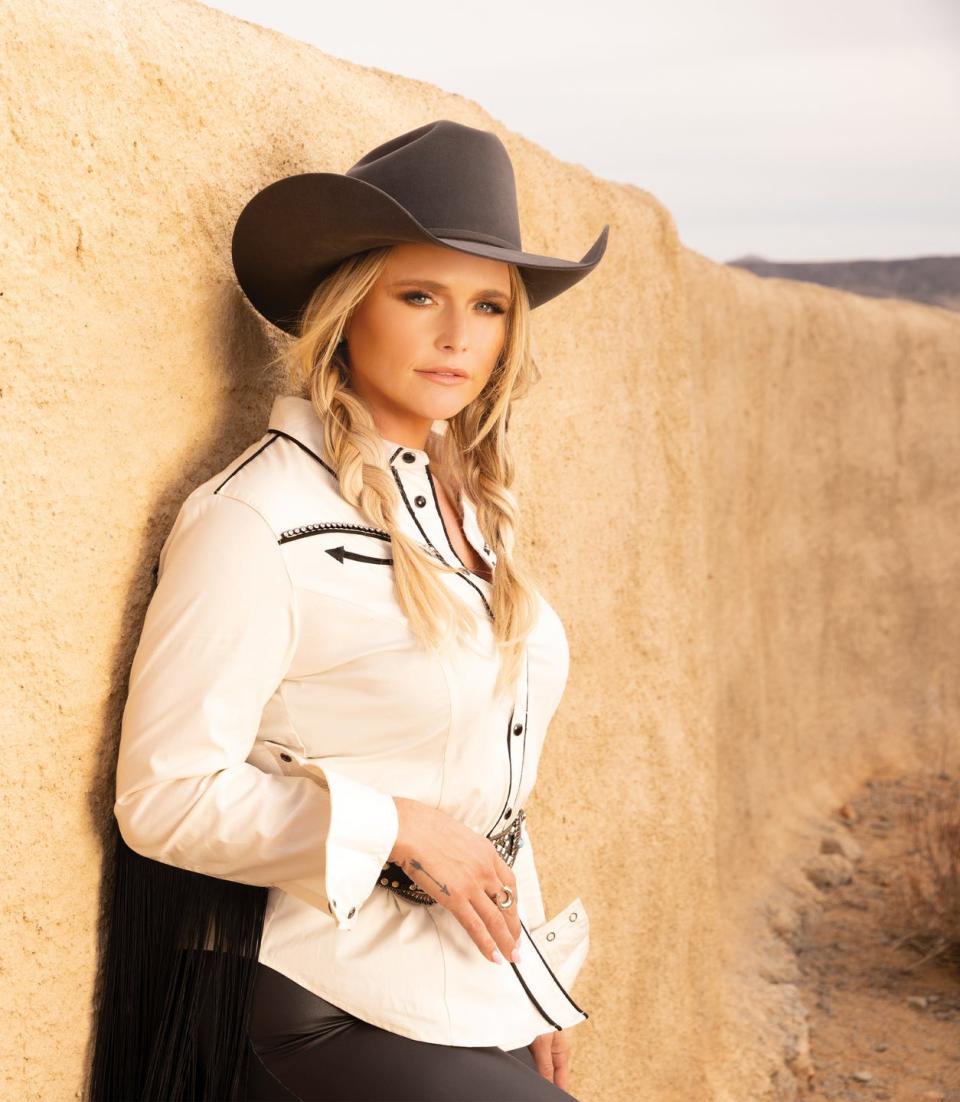
Lambert practically swoons at the mention of Saint Dolly Parton. "Dolly is a big one for me," she says, "because it's so much more than just the records—that's where it starts and ends, and that's why we all love Dolly. But the movies and the charity work and the theme park and the book, now she's on a dang cupcake box, what else can she do? That's something we should all strive for, to take our brand, take our songs, and grow them and touch people's lives in all kinds of ways."
The problem, though, is that Parton’s impact comes from being a full-fledged, universally beloved celebrity, which requires a willingness to stay in front of the cameras and to expose yourself in ways that have scarred Lambert. "I love writing songs, I love playing shows, I love that I can help dogs because of my job and that I have a clothing brand, but the celebrity part of it is on the bottom of my list," she says. "Some people thrive in that. You look at Reba, you look at Dolly, it's very much about the film and television side, and they're amazing at it. That's not something that I feel comfortable doing. It's not to say that I wouldn't dabble in it or try something, but that part of my life where tabloids came into the picture, all that invasion of privacy—I'm not willing to sacrifice that for any reason ever again."
So where does this leave her ambitions? Once you’ve been crowned Entertainer of the Year but have no aspiration to movie or TV stardom, then what happens? Life, it turns out. "When I start thinking about my goals for the next decade, a lot of it is life stuff," she says. "I want to take my Airstream down Route 66 with my husband—and I also want to maybe write a song and get an Oscar nomination. But I can balance those two things way better when I'm dreaming about the life part, and not just the career part. I've blocked all of July 'ML N/A'—not available. I'm going to go to Texas to float on the river."
First, though, she’s following up the release of Palomino with an amphitheater tour, co-headlining alongside Little Big Town, and preparing for the “Velvet Rodeo,” an extended residency at Planet Hollywood in Las Vegas running from September through the spring of 2023. “It should be taken up a notch or 12," she says of her Sin City production, "more sequins, more fringe, more fire. I'm actually worried to death about it, but being nervous means that I really, really care."
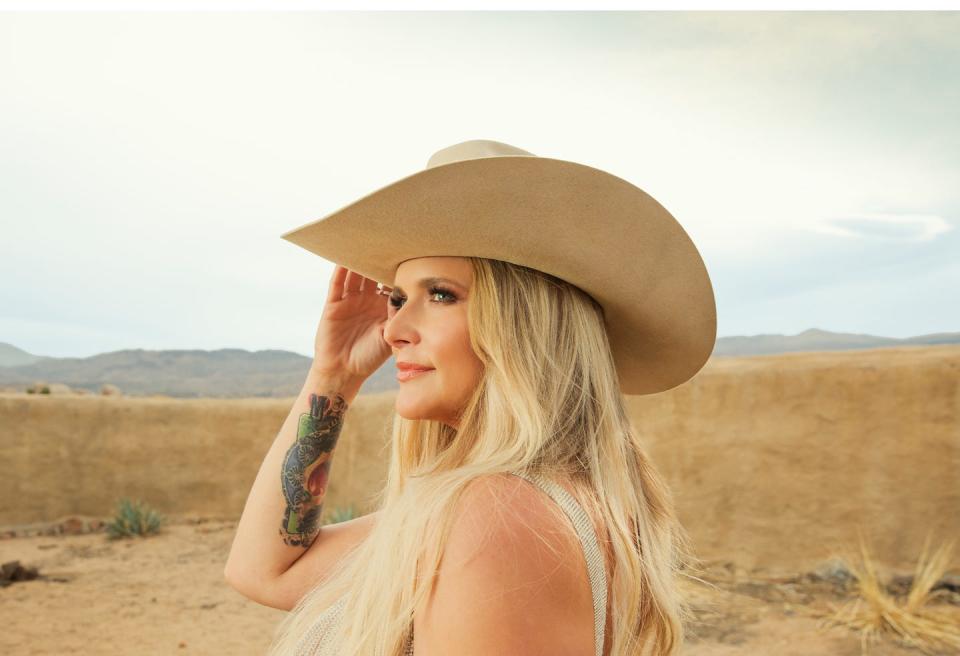
From the sparse, reverb-soaked space rock of "Actin’ Up" to the longing of "In His Arms" to a gospel-tinged cover of Mick Jagger’s "Wandering Spirit," the new songs reveal the extent to which Miranda Lambert has created an acceptance, even an expectation, that she will always keep pushing her musical boundaries. Almost twenty years in, she’s building a catalog that’s reminiscent of another one of her heroes, Tom Petty—who had some albums that were better or bigger than others, but never put out anything that was less than solid. Consistent, but never predictable.
"That's what we're supposed to do," she says, "reinvent, but stay true to your old self. It's a fine line to walk, but you can't help it—as you grow older and life happens to you, you can't help but evolve and change, and change artistically. And I think that’s important."
So what makes a song a Miranda Lambert song? From messages of tolerance to brutal payback fantasies, ZZ Top boogie to boot-scootin’ yee-haw, one acoustic guitar to polished pop arrangements—why do they all belong together? "I feel like I've lived a version of every song I've ever written, because it's just me telling my truth,” she says. "Or maybe fluffing it up a little, because it sounds better in a rhyme."
You Might Also Like

